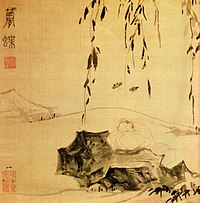
Photo from wikipedia
This article is devoted to the views on the goals and objectives of cognition of Gu Yanwu (1613–1682), the founder of the critical philosophy in China. These views, originally associated… Click to show full abstract
This article is devoted to the views on the goals and objectives of cognition of Gu Yanwu (1613–1682), the founder of the critical philosophy in China. These views, originally associated with the military-political projects of the Chinese elite of the Ming era and reflecting the strategy of the struggle for national sovereignty during the Manchu conquest of China, had a serious impact not only on the Confucian tradition of the following centuries, but also on modern Chinese studies. The concepts by Gu Yanwu were formed in the conditions of the emergence of new ideas about the world associated with the penetration of European knowledge and inventions into China. Because of his research concerning cognitive processes in the era of the collapse of the former Chinese and the emergence of the new Manchu official ideology, Gu Yanwu was able to rationally explain the evolution of the Confucian tradition. His rejection of neo-Confucianism and the search for other orientations of intellectual activity were derived from the desire to preserve the Confucian heritage after the death of the Ming Dynasty. The former neo-Confucian attitude to the synthesis and consistency of knowledge, which has a practical application in eliminating differences in descriptions of phenomena and events, has been replaced by an attitude to the analysis of knowledge and verification of the reliability of its source, also implying the verification of knowledge by practice. Gu Yanwu was the first to include field studies of geographical objects in essays on the standard Confucian issues of political culture and public administration. The idea of Yijing studies as the frameworks of Confucian tradition is fundamental to Gu Yanwu’s critical theory of cognition.
Journal Title: Voprosy filosofii
Year Published: 2023
Link to full text (if available)
Share on Social Media: Sign Up to like & get
recommendations!